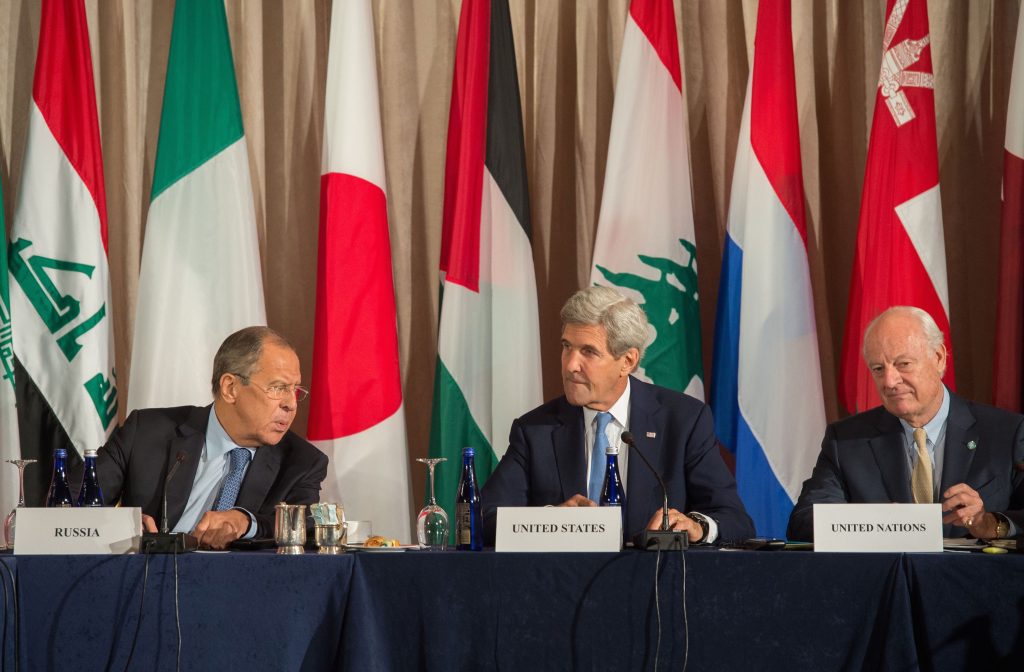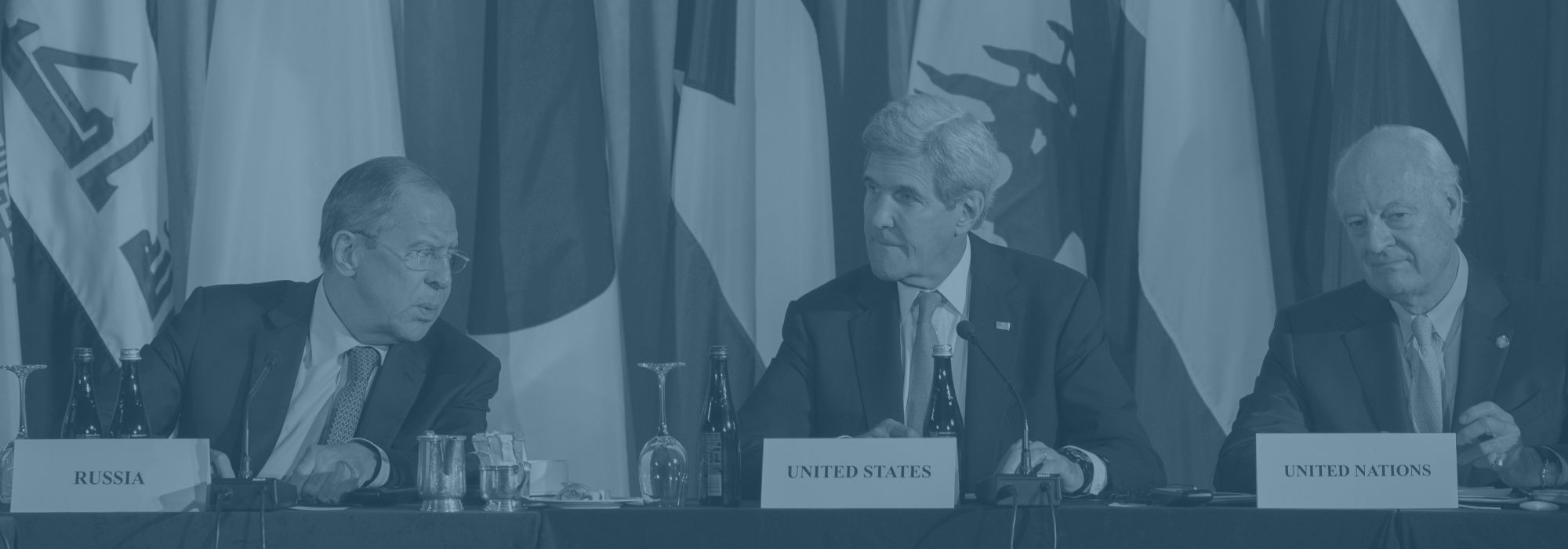Below is our new weekly publication, Friedman’s Weekly. This weekly will address topics and trends that are essential for gaining an understanding of geopolitics and the dynamics of the world in which we live.
By George Friedman
Yesterday the United States announced that it was breaking off talks with Russia over implementing a cease-fire agreement on Syria. Washington accused Moscow of failing to live up to its commitments in the Sept. 9 deal. It has been a year since Russia intervened in Syria. During that year, combat has continued and intensified. Apart from saving President Bashar al-Assad’s regime from hypothetical defeat, the Russians have achieved nothing particularly decisive in Syria. The Russians’ drama in Syria has come from dealing with the United States and, even more, with Turkey. However, the balance of power now appears to be shifting in favor of Assad and his Russian supporters. A confrontation with the United States is no longer inconceivable.

Syrian troops backed by Russian airpower and special forces have been closing in on Aleppo, Syria’s second largest city and a stronghold of the opposition to what most still call the government of Syria. If Aleppo falls, the last major urban area of Syria will be back in the hands of the Assad regime. This is significant, but not as significant as it sounds as much of the non-urban areas are occupied by the opposition, including a substantial amount controlled by the Islamic State (IS) and the Kurds.
The United States is formally opposed to the survival of the Assad regime. Before the Russian intervention, it appeared to some that Assad’s days were numbered. The appearance was murky as best. The opposition to Assad was poorly organized and in political chaos. The major opposition force operating in the country was IS. The United States might be opposed to Assad, but had no interest in toppling Assad and leaving a vacuum in Damascus that IS might have filled. Too many players wanted Assad gone, but not at that particular moment.
Why, then, did the Russians intervene? Oil prices had collapsed and the economy was staggering. The situation in Ukraine was not evolving in Russia’s favor. President Vladimir Putin had to demonstrate that despite the situation in Ukraine, Russia remained a significant power. In all countries, a national security crisis rallies the public for a while. Russia is no different, and deploying Russian aircraft in the Middle East drove home the difference between Putin’s government and its predecessors. National pride is a serious matter. Putin is an excellent politician and used it.
Putin also wanted to confront the United States in an opportune place. In his mind, the United States had engineered the fall of the pro-Russian government in Kiev, had been instrumental in blocking an effective secessionist movement in Eastern Europe and was now building up military capabilities in Poland and Romania. From the Russian point of view, this was beginning to look like the containment strategy that had ultimately strangled the Soviet Union. The Russians had no significant counter in Europe for military and political reasons. So they had to try a strategy of indirection.
The Russians wanted to achieve two things. They wanted to look good for their domestic audience and to challenge the United States in a region where it had a great deal at stake, but without being forced to take existential risks. Throughout the Cold War, the Russian counter to American containment was to create alliances to the rear of the containment line. Outside of Germany, the most important point in that line was Turkey. Turkey controlled the Bosporus and naval access to the Mediterranean. Russia could not overwhelm Turkey, although it made a number of covert attempts to destabilize it. But Russia could form relationships to Turkey’s south and in the eastern Mediterranean. Egypt, Libya, Iraq and Syria were all part of a pro-Soviet alliance system designed to counter containment from outside the line the U.S. had drawn.
With the fall of the Soviet Union, being pro-Soviet lost its meaning in the region. Indeed, the Arab Spring in these countries, which the West had fantasized was a rising as in Eastern Europe in 1989, was in fact directed against the remnant of the Soviet alliance system, driven primarily by the rising Muslim tide. The governments in these countries were ramshackle remnants of this system. They were secular, in the sense that they were hostile to Muslim threats. They were socialist in a way that had once barely made sense and now no longer made any sense. But above all they were military dictatorships. This is not to say these governments did not have substantial support in their countries. The idea that they were lone tyrants governing an entire country by fear was nonsense. They had strong support from tribal, ethnic, religious or other factions. They simply didn’t have enough support to be able to avoid repressing enemies.
Saddam Hussein was taken down by the Americans, who then discovered that his supporters were carrying out an insurgency against them. But in 2011, the other regimes came under attack: Hosni Mubarak in Egypt, Moammar Gadhafi in Libya and Assad in Syria. In Egypt, Mubarak fell but the army remained intact, so a military commander replaced him. In Libya, Gadhafi was deposed by American and European intervention, revealing that the uprising in Libya did not consist of people hungering to turn Libya into Wisconsin. And in Syria, many in Washington confused the uprising as a pro-Western democratic rising against an oppressive regime.
It turned out it was a rising of people who hated Assad, hated each other and pretty much hated the United States as well. The United States intervened covertly and then with airpower, but the day of the jubilee didn’t come. Assad and his supporters, a substantial minority in Syria called Alawites, controlled the military and carried out massive resistance against the opposition. The United States said it supported a secular democratic faction, and not finding one, pretended there was one. The mess that ensued has become the enduring reality of Syria.
Putin needed a lever against the United States. The period of intense conflict in Iraq was a gift to Putin. He used that time to rebuild Russian power as well as possible and to assert its presence in the former Soviet Union. He invaded Georgia, an American client state, knowing that the United States lacked the force to respond, given Iraq and Afghanistan. If America is bogged down in a conflict in the Middle East, it is unable to act elsewhere. To the extent that Russia could get the U.S. bogged down in the Middle East again, it would retain freedom of action.
More important, Putin needed a bargaining chip. He could not let Ukraine go, but at the very least had to negotiate its neutrality. Geopolitically, Ukraine is vital to Russia and neutrality is the least they could live with. The U.S. had no reason to accept that neutrality, and the Europeans were inclined the same way. If the Russians could create a situation somewhere in which the Americans needed Russian help, the situation around, and ultimately in, Russia would become less hostile for Moscow.
Assad was Russia’s old ally. That meant nothing to Russia. It had no real interest in saving Assad. At most it would get port facilities in Latakia and an air base, but there was little the Russians could do to exploit the facilities, which would be vulnerable to the United States. Moreover, Putin was in the KGB during the Russian-Afghan war. He had seen how a country could get hopelessly bogged down and sucked dry by intervening in the Muslim world. He understood that he lacked the resources and national interest for an extended stay.
Washington was transitioning during this time from a hyper-interventionist strategy to a more distant balance of power strategy. It is still transitioning. From Korea through Vietnam, Kuwait, Somalia, Kosovo, Afghanistan, Iraq and Libya, the U.S. strategy was to designate a country as significant, use aid, advisers and covert forces to try to shift the situation in a direction the U.S. wanted, and failing that, move to main force.
Douglas MacArthur had argued against any future land wars in Asia. His reasoning consisted of two parts. First, the United States was projecting force into another hemisphere and that required an extensive logistical tail. More troops would be involved in supporting the war effort than fighting the war. Second, as soon as Americans set foot in Asia (or Europe for that matter) they were facing a numerically overwhelming enemy. Technology could do only so much. Therefore, interventions, let alone constant interventions, in Asia were unwise. A string of stalemates, defeats and premature withdrawals attests to that. The fact that none of the failures caused an existential crisis for the United States indicated that the war was probably unnecessary.
It was inevitable, regardless of who was president, that this strategy would shift. Some people, both among neo-conservatives and humanitarian interventionists, believe that all the United States has to do is show up and it wins. I have no idea why they have this confidence in military force. I think Libya may have been the last humanitarian intervention. I think that Syria was the first attempt to influence events without committing major military force. It was clear that while the United States wanted Assad out, it was not a primary interest of the United States, nor one in which a multi-divisional force would be assigned. The same could be said about IS. Regional powers like Turkey, Iran, Saudi Arabia and Israel have a much higher stake than the U.S. has in the region’s future, and they were hostile to each other.
The U.S.’s goal in Syria, therefore, was to influence events and shape others’ interventions. Unlike prior wars, the fact that Syria was of American interest and that aid, training and covert operations were taking place did not mean that the United States was going to engage in a major war. The Russians understood this. In one sense, it weakened their position. Syria was not important enough for the U.S. to bargain other things away. In another sense, it strengthened their position. Their fairly small intervention (smaller than American forces nearby, but much greater and more effective than any other group in Syria) could shape the outcome of things.
Therefore, as Assad’s forces and the Russians headed toward Aleppo, Russia warned the United States that an American air attack on these forces would represent a “tectonic” shift. It is not clear what this means, but it seems to mean a fundamental shift in the Eurasian landmass and a threat, for example, of Russian action not only in Ukraine, but perhaps toward Poland or Romania. If this is what the Russians mean by tectonic, it seems a bit of a reach imagining Russian forces carrying out such massive operations, particularly after the U.S. has demonstrated a willingness to use American airpower in Syria.
The Russians understand the shift in U.S. strategy. They do not expect a significant military response. Nothing that Obama has done since taking office – except Libya, which he called his worst mistake – gives any indication that he will order airstrikes. So what are the Russians doing?
They want to continue to use Syria as a way to bolster Putin’s credibility at home and to give them a lever in negotiations over Ukraine. But a third possibility is emerging. The Russians may want to take a leading role in the Middle East. That would go against everything Putin learned from Afghanistan, and it would take logistical resources Russia doesn’t have. Plus, it significantly hampers Russia’s ability to operate in Europe. Russia has limited military resources, and deploying too much in the Middle East is dangerous. I would have to regard this as unlikely.
But then we also have to remember that the fall of Aleppo is far from the end of the war. The Russians have spent the past year as bogged down as the Americans. Taking Aleppo wouldn’t change that. In fact, the Russians would have to figure out how to feed Aleppo. And finally, Russia doesn’t really play in the American league any more than the Soviet Union did. As adroit as Russian political posturing has been, the most it has done is to save the Assad regime. It has not yet taken Aleppo.
A great deal of the Soviet Union was a giant bluff that led, unpleasantly for them, to a massive military buildup under Ronald Reagan, who chose to believe them. That’s the problem with a bluff. It’s not just that it may be called. It’s that it may be believed. With the U.S. as an adversary, bluffing is a dangerous move. The U.S. can be unpredictable, as the Soviet Union experienced. But even without any dramatic American steps, the Russian position sounds better than it is.







 Special Collection – The Middle East
Special Collection – The Middle East